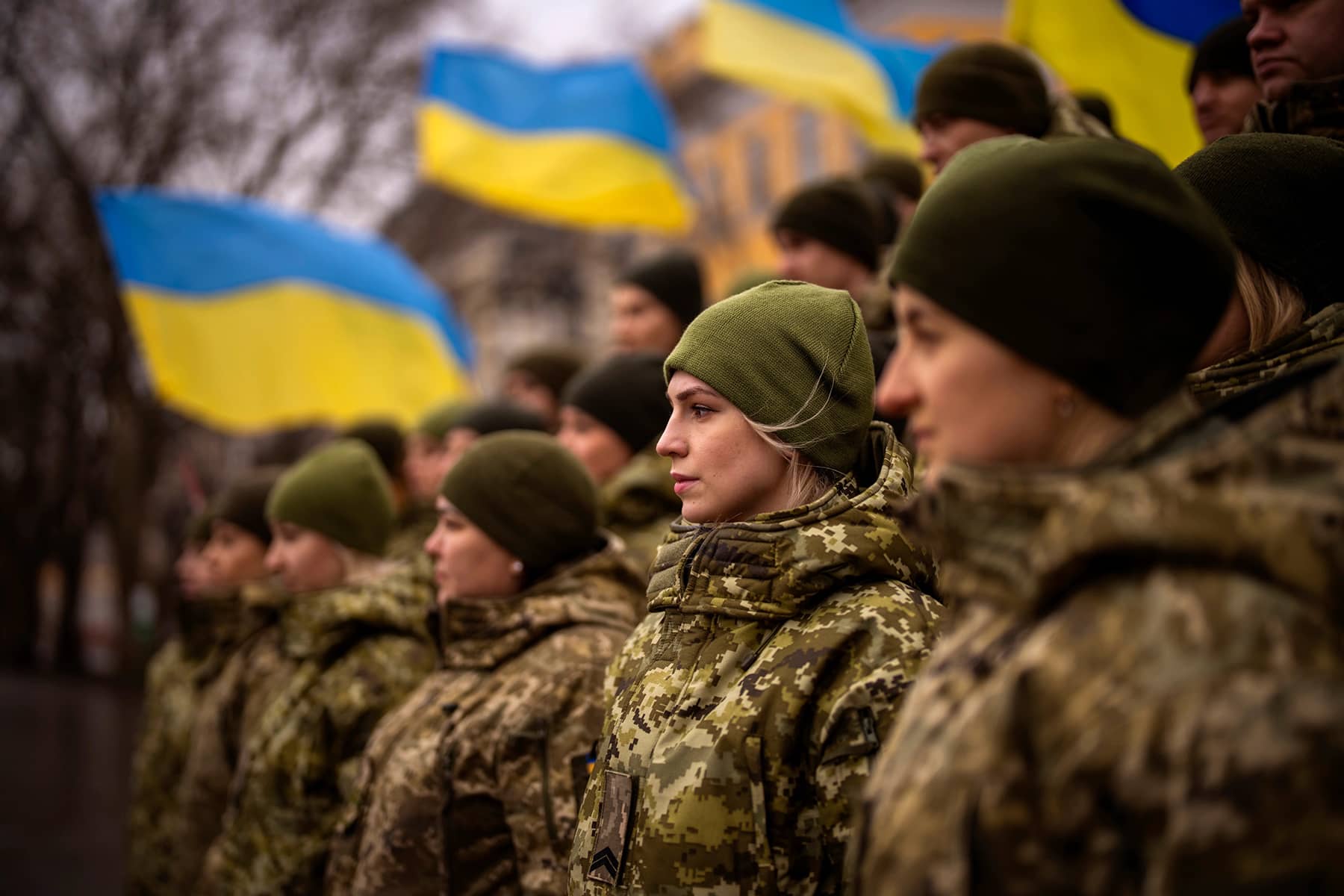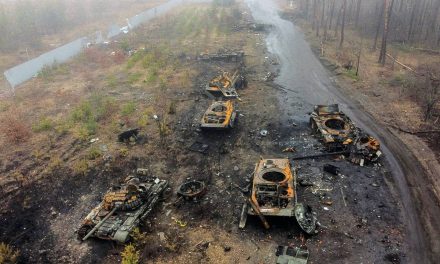
Tamara Zlobina, a philosopher, culturologist and editor-in-chief of “Gender in Detail,” explains why Western “peacekeeping” initiatives in the midst of conflict are a blind and shameful stance.
During the two months of the war, I saw four appeals from Western feminists not to give Ukraine weapons. Italians, Germans, and feminists from Spanish-speaking countries joined by North Americans stood out.
The “Feminist Anti-War Resistance” is one of the few movements still trying in a coordinated a balance to resist the gloom, and feminists from Central and Eastern Europe are as shocked by their Western counterparts as we are.
All these calls sounded like “We are against war! War is bad. These are men’s games! We demand peace! We are against giving Ukraine weapons, because weapons will only inflame the conflict even more. Stop the war immediately.”
None of the “sisters” thought of consulting with Ukrainian feminists in writing these appeals. When Ukrainian women accidentally read these statements before they were made public and criticized them, their voices were simply ignored.
The open letters give the impression that all these respected professors with lifelong positions in prestigious universities have closed their eyes and expect a pink unicorn to appear. And now they are seriously waiting for him to appear.
But pink unicorns do not exist. Just as there are no wars as “men’s games” and “consequences of patriarchy,” which do not affect women at all.
Western anti-militarist theory positions wars as something like a struggle between two villains for resources. Well, for example, the bad capitalist and imperialist United States is fighting the bad dictator Saddam Hussein for oil in Iraq. Therefore, it is necessary to demand the disarmament of both sides and to put at the negotiating table women who, due to gender role, will worry about the future of children, not the macho pride of a national ego who can not lose.
So feminist foreign policy is to promote disarmament, empower women, and encourage them to engage in “peacekeeping.” This vague phrase translates as being leaders in their fields and taking the most active part in decision-making at various levels.
I am increasingly shocked that some recognized intellectuals are foolish in their inability to see the basics of their own judgments. I used to have the impression on Western programs that some of them were nonsense – but I thought that I probably read a few books and did not understand something. Such respectable people cannot be wrong. Now I know that with my critical thinking at such moments everything was very okay.
Despite all these tons of academic White Papers written over the last 50 years, people need to check their privileges. They have to analyze from which position they speak. Maybe some power imbalances from their position are invisible, so they need to listen to discriminated from the “blah blah blah.”
Proponents of Western anti-militarism are the most obvious in being oblivious to their privilege. That they are all from imperialist countries that have a centuries-old colonial history. And the wars they theorize about are the ones their states are waging on the territory of other countries. Or those that took place in completely different contexts than theirs, in which they were very poorly understood.
None of the countries of Western Europe or North America where this anti-militarist discourse has been created for the last 30 to 40 years has had wars or revolutions for 70 years.
No feminist professor, no Western intellectual has been threatened with their own life by fighting the dictatorial regime. Or because their country has decided to be occupied by an aggressive neighbor, to kill all dissidents, and some of the survivors to be taken to build new cities somewhere in the desert.
This is one of the two blind spots that turned some Western intellectuals into foolish idiots.
They continuously present such a phenomenon as the liberation wars. For example, the struggle of the people against the dictatorship, as in Syria. The struggle against the occupation of another state, as we have now. The struggle to create their own state, like the Kurds.
That is why peacekeeping initiatives and feminist foreign policy leaders have now gone quiet. Because in their conceptual framework there is no liberation war, in which one of the parties is law. There are only two patriarchal villains who quarrel with each other, while women and children suffer. Therefore, it is impossible to support one of the parties with weapons. They have not yet encountered a situation in which the injured party has “more weapons = less casualties.”
Instead they met, but closed their eyes wide. Their conceptual blindness has been multiplied by propaganda and “not so unambiguous” narratives that benefit both the aggressors and the economic elites of Western countries. How else could France and Germany continue to sell weapons to Russia after 2014, and rely on Russian gas?
Therefore, this version of anti-militarism was willingly supported by corporations and politicians – such a convenient and noble cover for business as usual.
Despite all the this, in our case it is obvious that Russia’s aggression is criminal. This fact is self-evident. Therefore, one blind spot is not enough to generate a wave of letters saying “do not give Ukraine weapons, because we are for peace!”
The second blind spot of Westerners is a misunderstanding of the essence of war. They think the war ends in peace.
In their world, this is how it ends: there was news on television about the war in country X (some place distant and “uncivilized”), and then the horrible footage stopped being shown. And in general, the news from this country has disappeared, because their “peace has come.”
When you live the war on TV, it is very easy to assume that “there are no winners in the war.” And in reality, war always ends in someone’s victory – overt or covert. Only after the victory of one side and the defeat of the other comes peace.
And the content of peace depends very much on which side of the conflict wins the war. For example, Ichkeria won the first Chechen war and began to rebuild itself as an independent state. And the second it lost, and was wiped off the face of the earth.
In both cases, there was a “peace.” The difference between them is huge.
All these Western “peacekeeping” initiatives in the midst of the conflict are, in fact, indifferent to who will be the winner and who will be the loser in the conflict.
“Just sit down at the table and agree to peace regardless the cost or loss. We don’t care who was raped or who was killed. Just reconcile your differences, conflict is bad. Ukrainians, you agree to peace on any terms. Don’t you understand that the longer the war lasts, the more people die? We don’t care that Russia is building concentration camps, deporting people en masse to Siberia, kidnapping activists in the occupied territories, and that Russian soldiers are robbing, raping and bullying people for fun. That in the Russia-controlled and peaceful Ukraine it will continue on an even larger scale.”
The news about the outcomes of other wars those terms is not shown. Collaborators or puppets in suits signed an agreement for their country, and after that the news about their country simply stopped. That meant that in the future everything was fine.
I advise all feminists who have signed open letters urging the West not to give weapons to Ukraine to imagine what the world would be like if World War II ended not with the defeat but with the victory of Nazi Germany.
There would also be peace. Even much faster if the countries did not resist. Great-grandfathers would not have died because they did not take part in the resistance movement. Sure, the Jews would have been exterminated, but the French or Belgians were safe. They would continue to live, raise children, simply in German. Somewhere near Magadan, where the population of France would be deported to work in the mines.
These kind of open letters from feminists infuriate me, but do not surprise me. A typical example of how people rely on ideological patterns instead of thinking in their head, and responding in an innovative way to the challenges of reality. It is simpler, more convenient, takes less energy, and leads to shame.
As a feminist, I say #ArmUkraineNow. And then I will develop a feminist international policy based on the reality it is, not fantasies about pink unicorns. Recognize the challenges and threats, be sensitive to liberation wars, and encourage governments to provide immediate assistance to those who defend themselves and those who fight for freedom.
Tamara Zlobina
Еmіlіо Morеnаttі
Originally published as Західні феміністки закликають не давати Україні зброю. Чому це сліпа та ганебна позиція (Погляд)














